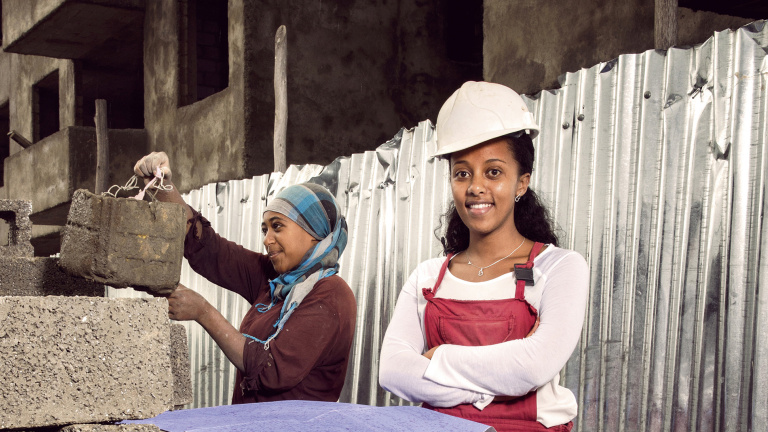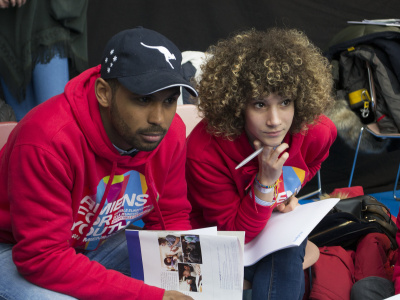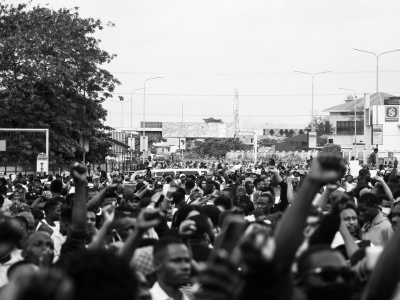
Youth employment in fragile states: Building the foundations first
High and persistent youth unemployment only reinforces fragility. IFC’s approach to supporting youth employment in fragile and conflict-affected countries is to help tackle structural issues in those economies, through an innovative ‘fragility and conflict lens’.
The scourge of high youth unemployment is a source of deep pain to economies and societies around the world. When young people cannot find meaningful work, their pride is damaged, they might lose hope and, finally, slide into a life of long-term dependence or even crime.
In fragile states, the consequences of youth unemployment can be more drastic. Jobless young men might be lured into ‘working’ with militia or rebel groups, picking up guns when they can’t pick up payslips. Jobless women might struggle to feed or educate their children — and themselves.
High and persistent youth unemployment only reinforces fragility, keeping fragile places locked in spirals of poverty and instability.
Worryingly, according to a recent report by the International Labour Organization, global youth unemployment is on the rise, reaching 71 million in 2016. The same report reveals that another 150 million young people – most of them in emerging and developing economies, including fragile states – live in poverty despite having a job.
The solutions to youth unemployment are complex, especially in fragile states, where insecurity, competition among groups and regions, and extreme poverty make them difficult to implement and sustain.
Providing education, training, and skills is crucial. But so is supporting entrepreneurs and businesses with loans and other financial products. Finally, no economy can grow and create jobs without infrastructure: roads, ports, and power stations are the backbone of development.
Creating opportunities
IFC, a member of the World Bank Group, places a high priority on creating opportunity where it is needed most. As the world’s largest global development institution focused exclusively on the private sector in developing countries, IFC has extensive experience supporting growth in countries recovering from conflict.
Countries affected by fragility and conflict are among the poorest in the world. Almost all suffer from dangerously high and entrenched levels of youth unemployment, in some cases over 50%.
The problem of youth unemployment is not unique to these countries, of course. Especially since the financial crisis, Greece, Spain, and other countries have witnessed surging numbers of unemployed young people. However, the problem for fragile and conflict-affected countries is compounded by another serious factor: soaringly high birth rates.
Mali, Burundi, Somalia, South Sudan, and the DRC are but a few of the conflict-affected countries among the nations with the world’s highest birth rates – a scenario that will only toughen their battle against youth unemployment in future decades.
The foundation first
IFC’s approach to supporting youth employment – and, for that matter, all employment — in fragile and conflict-affected states (FCS) is to help tackle structural issues in those economies.
For obvious reasons, builders lay the foundations first. The same is true when building an economy: a strong foundation will help support job growth, business creation, trade, and even skills development. Building an economic foundation means mainly three things: first, creating a legal and regulatory environment conducive to business growth; next is establishing reliable infrastructure such as power and sanitation plants, roads, ports, etc.; and finally, strengthening the financial sector so it can play its part facilitating trade and funding businesses and projects, both large and small.
Burundi, Côte d’Ivoire, Liberia, and Sierra Leone – all supported by IFC – have ranked among the best-reforming African FCS in recent years as measured by the World Bank Group’s ‘Doing Business Report’, a comprehensive guide to the ease – or difficulty – of doing business in countries around the globe.
And as governments continue to take up the reform agenda, the 2016 Doing Business Report reveals gathering success on the ground. For example, it now takes an average of 27 days to start a business in Sub-Saharan Africa, compared with 37 days only five years ago. This improvement is seemingly minor, but when combined with dozens like it, the effect might be enough to help thousands of young entrepreneurs to stay fixed on their dreams. Working with public and private sector partners, and especially through its Conflict Affected States in Africa Initiative (CASA), co-funded by Ireland, the Netherlands, and Norway, IFC has helped a number of African countries implement reforms to sound economic growth. These reforms, sometimes minor regulatory enhancements, sometimes sweeping legal changes, have made it easier for entrepreneurs in fragile states to start a business, access credit, trade across borders, use collateral for loans, lease equipment, and obtain construction permits, among other benefits.
Infrastructure
Cutting red tape and implementing a solid legal framework is necessary but not sufficient for business growth in fragile and conflict-affected countries, where a lack of infrastructure is often cited as a major hurdle to development.
Take Liberia, for example, where the lights really did go out – all of them. The country suffered through a long and brutal civil war that devastated its infrastructure, including practically wiping out its ability to generate power. According to reports at the time, power plants were specifically targeted by warlords, and everything was stripped for scrap, including cables, conductors, and transformers.
Years after the fighting concluded, business growth, education, and even safety were all seriously compromised under these trying conditions. Invited by Liberia’s government, IFC stepped in and helped establish a partnership between the Liberia Electricity Corporation (LEC) and Canada’s Manitoba Hydro to return power to parts of the country’s capital, Monrovia.
Working with other partners and the World Bank, IFC helped Liberia design and tender a management contract that enabled the Canadian firm to oversee LEC’s operations for five years, starting in 2010. Besides transferring invaluable skills, expertise, and capacity building, the partnership proved a huge success for Liberia, connecting tens of thousands of homes and businesses to the grid.
In 2012, IFC spoke with one Liberian woman benefitting from the electricity partnership. Marisa Thorpe paid about $3 a day for power from costly sources before being connected to the grid. With a grid connection, that had fallen to only about $5 a month: “My children can enjoy studying under light,” Marisa said. “Electricity has really improved our lives and I have a freezer and sell ice and cold water, which helps pay the children’s school fees.”
The ultimate goal here, and in numerous other infrastructure projects IFC has supported in fragile and post-conflict countries, either with advisory support or a direct investment, was to improve lives and create the conditions for economic growth.
Strong financial sector
The final building block for a solid economic foundation is a strong financial sector. Businesses can only blossom and create jobs if they have access to loans or other instruments to invest in raw materials, machinery, or other vital goods or services.
Unsurprisingly, financial institutions in most fragile and post-conflict countries lack the capital, capacity, and reach they need to facilitate economic growth and to do it quickly and consistently. One statistic in particular reveals this shortcoming: across sub-Saharan Africa, only about one in five people have a bank account (compared to 90% in high-income countries).
IFC’s SME Ventures programme is helping fill the financial gap in many post-conflict and frontier markets, where the demand for capital is enormous. SME Ventures’ innovative model provides both risk capital and technical assistance to entrepreneurs, helping investee firms grow. It has also helped pave the way for other investors to enter these markets.
The programme has six funds, which invest in West and Central Africa, as well as in Cambodia, Laos, Myanmar, Nepal and Bangladesh. Between 2012 and 2015, for example, the Central Africa SME Fund invested in 32 companies, directly creating hundreds of jobs and supporting many more indirectly.
Business unusual
IFC realises that supporting business growth in fragile and post-conflict countries is never ‘business as usual’. Implementing a project or supporting reforms in a country recovering from conflict is markedly different from doing the same in a place enjoying relative national cohesion and decades of peace and stability. What IFC does differently in these countries is, increasingly, to view its projects there through a ‘fragility and conflict lens’. This innovation, developed with Dutch partner Clingendael, helps IFC determine how its investments and advisory work can best contribute to stability, inclusion, and the fostering of economic growth that supports all groups – including women and young people.
Besides the conflict lens, IFC’s work in these countries pays special attention to incubating local businesses, de-risking investments, and being present on the ground. Working at a shared table with public and private sector partners enables partners to understand and navigate the complexity, challenges, and strengths of these difficult environments.
Addressing the skills gap
While the macro-level improvements detailed above are critical for supporting job growth, no economy can grow without the sweat and perseverance of smart, motivated individuals. Building an economy’s foundations can – and should – happen concurrently with addressing the skills gap, promoting and supporting entrepreneurship, and establishing schools or other institutions to offer young people the tools and backing they need to succeed.
In Sierra Leone, for example, IFC has supported an annual business plan competition that offers young people with innovative business ideas the chance to win training and funding to realise their dreams.
In the Democratic Republic of Congo, IFC is exploring the possibility of an investment and advisory programme in the turbulent east of the country that would help young people find work and gain skills in the extractives industry. DRC has long suffered from conflict and instability and, according to a 2015 report, at least 70 armed groups are operating in the east. Elders there fear more and more of the region’s unemployed young men will happily pick up guns if they can’t find paying work. Investing in DRC’s natural resources sector is one important way to create badly-needed jobs.
And in the Middle East and North Africa, where youth unemployment hovers around 25%, IFC launched a joint investment and advisory initiative that is supporting programmes that prepare students for work in fields like tourism, logistics and information technology.
The Education for Employment Initiative for Arab Youth (‘E4E’) partners with the private sector and governments to reduce skill gaps in Jordan, Tunisia, Egypt, and Morocco, specifically in high-growth industries like ICT and tourism. The Initiative supports public-private mechanisms to better inform both the demand and supply of skills for young people, and influences the content of training programmes to align them with market needs. The goal by the end of fiscal year 2018 is to equip about 15,000 young men and women with in-demand skills attractive to employers. Initiatives like these, when combined with a strong business environment, modern infrastructure, and ready access to capital, are a winning recipe for job creation. Countries that do more to build their foundations today will help secure the future of their young people tomorrow.
Doing more
IFC is also doing more. Five years ago, our FCS portfolio was a mere US$300 million worldwide. Today, it is US$3.5 billion, including US$1 billion invested last year alone, US$200 million of that in Africa. Our ambition is to go even further – and triple our portfolio in FCS by mid-2020 compared to where we were in mid 2016. Increasing our activities in fragile states is important because young people there do more than earn a living when they find or create a job: they contribute to the future peace and stability of their communities and countries.
About the author
Michel Botzung is Manager of the Fragile and Conflict Affected Situations Africa Program at IFC, a member of the World Bank Group.
Read the full magazine issue





